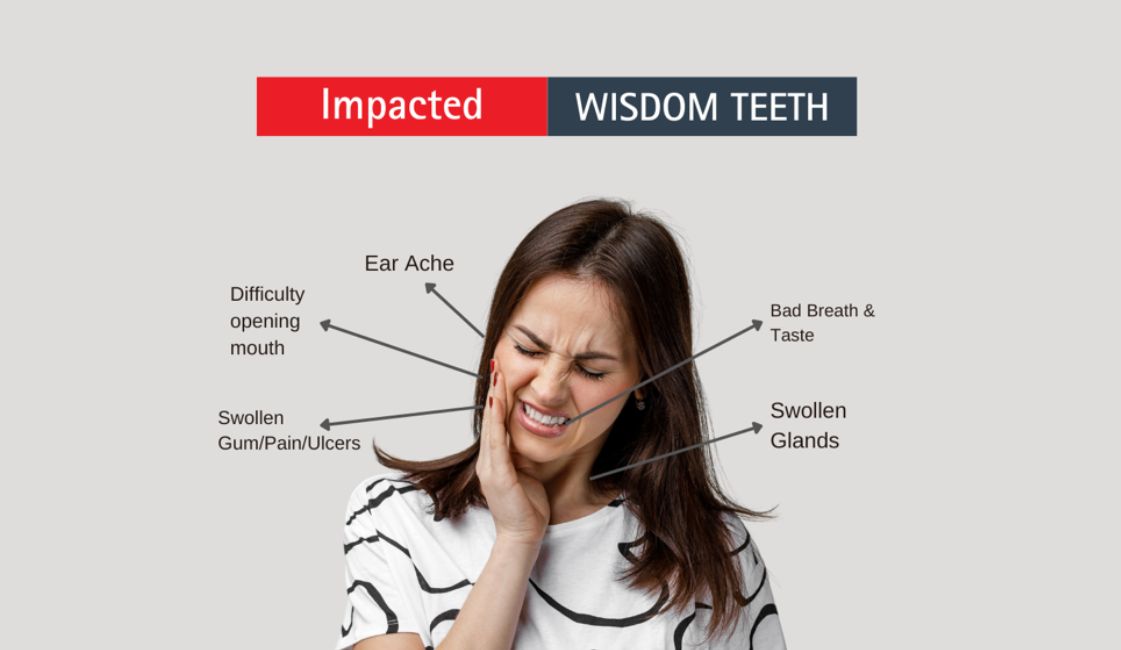Wisdom Tooth Pain: What You Need to Know

Wisdom teeth are the third set of molars that erupt in the mouth, typically between the ages of 18 and 25. They are also known as the “back teeth.” Wisdom teeth can cause a number of problems, including pain, swelling, and infection.
Symptoms of Wisdom Tooth Pain
The most common symptom of wisdom tooth pain is pain in the jaw. This pain can be mild or severe. Other symptoms of wisdom tooth pain include:
- Swollen gums
- Bleeding gums
- Difficulty opening the mouth wide
- Bad breath
- Earache
- Sinus pain
- Fever
Causes of Wisdom Tooth Pain
Wisdom teeth pain is caused by a number of factors, including:
- Impacted wisdom teeth: Impacted wisdom teeth are those that do not fully erupt. They can become infected and cause pain.
- Partially erupted wisdom teeth: Partially erupted wisdom teeth can also become infected and cause pain.
- Crowded teeth: If there is not enough space in the jaw for the wisdom teeth to erupt, they can become impacted.
- Gum inflammation: Gum inflammation, also known as gingivitis, can make wisdom tooth pain worse.
Treatment of Wisdom Tooth Pain
There are a number of treatments for wisdom tooth pain, including:
- Over-the-counter pain relievers: Over-the-counter pain relievers, such as ibuprofen or acetaminophen, can help to relieve pain and inflammation.
- Saltwater rinses: Saltwater rinses can help to reduce swelling and inflammation.
- Ice packs: Ice packs can help to reduce pain and swelling.
- Dental cleaning: A dental cleaning can help to remove plaque and tartar from around the wisdom teeth, which can help to reduce inflammation.
In some cases, wisdom teeth may need to be extracted. This is a surgical procedure that is performed by a dentist or oral surgeon. Extraction is typically recommended if the wisdom teeth are causing severe pain, infection, or damage to the other teeth.
Prevention of Wisdom Tooth Pain
There is no surefire way to prevent wisdom tooth pain, but there are some things that you can do to reduce your risk:
- Visit your dentist regularly: Regular dental checkups can help to identify any problems with your wisdom teeth early on.
- Good oral hygiene: Brushing and flossing your teeth regularly can help to prevent gum inflammation and infection.
- Avoid hard foods: Hard foods can damage the wisdom teeth and make pain worse.
Additional Tips for Relief
In addition to the treatments listed above, there are a few other things that you can do to find relief from wisdom tooth pain:
- Apply a cold compress to the outside of your jaw.
- Eat soft foods.
- Avoid hot foods and drinks.
- Rinse your mouth with warm salt water after eating.
If you are experiencing severe wisdom tooth pain, be sure to see your dentist. They can help to diagnose the cause of your pain and recommend the best course of treatment.
Conclusion
Wisdom tooth pain can be a bothersome problem, but there are a number of treatments available to help relieve it. If you are experiencing wisdom tooth pain, be sure to see your dentist to get the right treatment for you.
Disclaimer
This article is for informational purposes only and should not be used as a substitute for professional medical advice. Please consult with your dentist or other qualified healthcare provider if you have any questions or concerns about your wisdom teeth.
